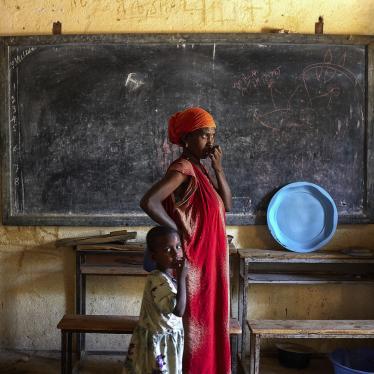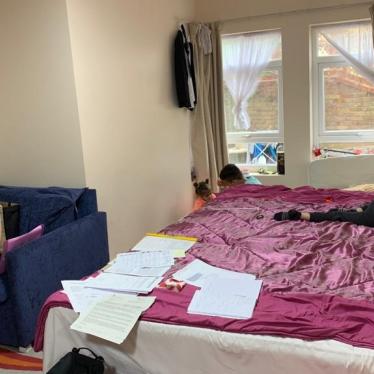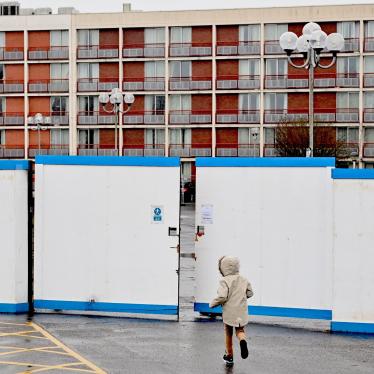Earlier this month, Russian forces launched an attack at a psychiatric hospital about 15 miles southwest of Grozny, killing its chief doctor and wounding three others.
Two eyewitnesses independently confirmed that on the morning of November 1, a Russian unit that had taken up a position at the Zakan-Iurt psychiatric hospital the previous night fired on the doctors and nurses who came in the morning to care for their patients.
"This attack is a grave breach of international humanitarian law," said Holly Cartner, executive director of Human Rights Watch's Europe and Central Asia division. "The Russian government claims it is doing everything possible to avoid civilian casualties, but that is simply not true."
Human Rights Watch investigators in Ingushetia separately interviewed chief medical orderly Umar Uzarov and head nurse Dagman Tepsurkaeva -- one in the Sunzha district hospital and one in Galashki hospital -- and both described the incident in detail. Their accounts fully corresponded to each other.
Uzarov and Tepsurkaeva told Human Rights Watch that their hospital, clearly marked with the distinctive emblem of the Red Cross, harbored no enemy forces and was home to approximately 30 defenseless patients. Staff members arriving at the hospital came under a twenty-minute siege by Russian troops dug in along the road close to the hospital gates. According to Uzarov's account, the protected nature of the hospital was clear:
"The psychiatric hospital is located on the Sunzha ridge, close to the town of Samashki. It is an isolated building; no one lives nearby. During the last war, we worked right through and didn't close the hospital once. This year, as the Russian forces approached, we made red cross flags from white material and hung them on all sides of the hospital buildings, to let them know that this is a hospital and that there are no fighters here."
"On October 31 we finished work for the day and locked up the building. We didn't see any Russian soldiers, but we were afraid that they might come during the night," continued Uzarov.
At 8:00 a.m on November 1, Uzarov drove in a private car together with head doctor Rashid Dadaev, 50; chief accountant Alkhazur [last name unknown]; head nurse Tepsurkaeva; and secretary Khadishat Basaeva up to the hospital gates. Dr. Dadaev sat in the front passenger seat, holding a large white paper with a red cross up to the windshield of the car to mark it as a medical vehicle. The sign would have been clearly visible as the car approached the hospital. The firing began as the chief accountant got out of the car and opened the hospital gates.
"Rashid and I both yelled at the others to get out of the car and lie flat," recalled Uzarov; the others jumped out of the car and into the drainage ditches on either side of the road. "They shot at us for about twenty minutes, from machine guns, and twice they used a grenade launcher [in Russian, "iz podstvolnika"].... We were in the ditches, and near the fields there were trenches, where I guess the soldiers were. They were 17-18 meters [about 50 feet] away from us...We thought it was the end for us...After about 15 or 20 minutes we saw 15 of them moving towards us--they weren't young ones, they looked about 30 or 35 years old. Some of them were shooting in the air, some towards the ground. I had the red cross in my hand, and I told the women to start crying so that they don't kill us...They swore at us and told us to get up and go to the hospital gate with our hands up."
Dr. Dadaev, however, did not respond. One of the soldiers opened the car door with his gun and asked them, "Who's this?" Uzarov then understood that Dr. Dadaev had been hit while still in the car. He replied, "That's our head doctor."
Basaeva was hit by shrapnel; Tepsurkaeva was wounded in the leg and pelvis; Uzarov received superficial bullet and shrapnel wounds. The group returned to Zakan-Iurt on foot after soldiers allowed Uzarov to take Dadaev's body back to the village on a hospital cart.
On November 6, Uzarov attempted to return to the hospital, after Said, a village elder from Zakan-Iurt, reportedly negotiated with the soldiers to allow personnel to tend to patients remaining there. At 1:50 p.m., as Saidand the Russian unit had agreed, Uzarov rode up on a red tractor with three cars ahead of it. Russian snipers suddenly opened fire, hitting Uzarov in the leg and shattering his left shin bone. The group of elders who rode with Uzarov began to shout, "Don't shoot! What are you doing? In broad daylight! This is a hospital!" According Uzarov, the soldiers rode up to the building in an armored personnel carrier and drove off with Uzarov to their unit, where they gave him first aid, and issued him a document certifying that he had received medical treatment. At the end of the day they drove him back to the village.
The fate of the hospital's patients remains unknown. Both Uzarov and Tepsurkaeva both noted that some of the patients would not be able to flee by themselves.
International humanitarian law forbids attacks on civilians and civilian objects, such as hospitals. The Geneva Conventions specifically prohibit attacks on medical personnel and require Russian forces to respect and protect medical personnel, medical units, and medical transports, and to respect the emblem of the Red Cross. The Geneva Conventions also require that the sick be respected and protected, treated humanely, and granted necessary medical care.








